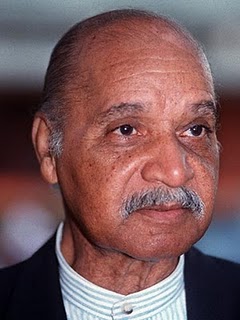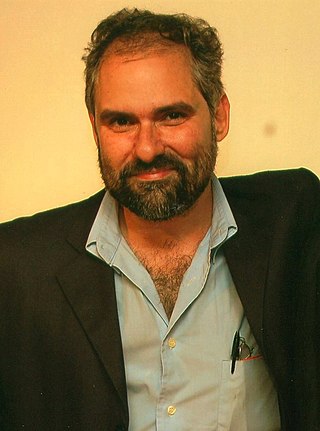Silviano Santiago | |
|---|---|
 | |
| Born | September 26, 1936 Formiga, Minas Gerais, Brazil |
Silviano Santiago (born 29 September 1936) is a Brazilian writer, literary critic, essayist and scholar. [1]
Silviano Santiago | |
|---|---|
 | |
| Born | September 26, 1936 Formiga, Minas Gerais, Brazil |
Silviano Santiago (born 29 September 1936) is a Brazilian writer, literary critic, essayist and scholar. [1]
Santiago was born in the city of Formiga. At the age of ten, he moved to Belo Horizonte. In 1954, he began writing for a film magazine and helped to idealize and publish the magazine Complemento. He got a degree in Neolatin languages at the Federal University of Minas Gerais [2]
Santiago moved to Rio de Janeiro in 1961, where specialized in French literature, which will lead him to a doctorate at the University of Paris, Sorbonne. [3]
He applied as an instructor at the University of New Mexico in Albuquerque from 1962 to 1964. In 1969, he published in an anthology of Brazilian literature in New York.
Santiago taught at the Rutgers, Toronto, New York, Buffalo and Indiana universities. In Brazil, he was a professor at the Pontifical Catholic University of Rio de Janeiro and at the Fluminense Federal University.

The Camões Prize, named after Luís de Camões, is the most important prize for literature in the Portuguese language. It is awarded annually by the Portuguese Direção-Geral do Livro, dos Arquivos e das Biblioteca and the Brazilian Fundação Biblioteca Nacional to the author of an outstanding oeuvre of work written in Portuguese. The monetary award is of €100,000, making it among the richest literary prizes in the world.

José Craveirinha was a Mozambican journalist, story writer and poet, who is today considered the greatest poet of Mozambique. His poems, written in Portuguese, address such issues as racism and the Portuguese colonial domination of Mozambique. A supporter of the anti-Portuguese group FRELIMO during the colonial wars, he was imprisoned in the 1960s. He was one of the African pioneers of the Négritude movement, and published six books of poetry between 1964 and 1997. Craveirinha also wrote under the pseudonyms Mário Vieira, José Cravo, Jesuíno Cravo, J. Cravo, J.C., Abílio Cossa, and José G. Vetrinha.

António Emílio Leite Couto, better known as Mia Couto, is a Mozambican writer. He won the Camões Prize in 2013, the most important literary award in the Portuguese language, and the Neustadt International Prize for Literature in 2014.

Brazilian literature is the literature written in the Portuguese language by Brazilians or in Brazil, including works written prior to the country's independence in 1822. Throughout its early years, literature from Brazil followed the literary trends of Portugal, whereas gradually shifting to a different and authentic writing style in the course of the 19th and 20th centuries, in the search for truly Brazilian themes and use of Brazilian forms.

Eugénio de Andrade was the pseudonym of GOSE, GCMJosé Fontinhas, Portuguese poet. He is revered as one of the leading names in contemporary Portuguese poetry.
Zélia Gattai Amado de Faria was a Brazilian photographer, memoirist, novelist and author of children's literature, as well as a member of the Brazilian Academy of Letters. Gattai wrote 14 different literary works, including children's books and her own personal memoirs have been widely published.

João Ubaldo Ribeiro was a Brazilian writer, journalist, screenwriter and professor. Several of his books and short stories have been turned into movies and TV series in Brazil. Ribeiro was a member of the Brazilian Academy of Letters, being elected in 1994. At the time of his death many considered him to be Brazil's greatest contemporary novelist.
Frederico Barbosa is a Brazilian poet.

Miguel Torga, pseudonym of Adolfo Correia da Rocha, is considered one of the greatest Portuguese writers of the 20th century. He wrote poetry, short stories, a genre in which he is accounted a master, theater and a 16 volume diary, written from 1932 to 1993.

The Prêmio Machado de Assis is a literary prize awarded by the Brazilian Academy of Letters, and possibly the most prestigious literary award in Brazil. The prize was founded in 1941, named in memory of the novelist Joaquim Maria Machado de Assis (1839–1908). It is awarded in recognition of a lifetime's work.

Augusto Meyer was a Brazilian poet, journalist, and folklorist. He won the Prêmio Machado de Assis in 1948.
Júlio Afrânio Peixoto was a Brazilian physician, writer, politician, historian, university president, and pioneering eugenicist. He held many public offices, including Brazilian congressional representative from Bahia in the federal Câmara de Deputados (1924–1930), first the president of the Universidade Federal do Rio de Janeiro, member of the Brazilian Cultural Center in the United States, president of the Academia Brasileira de Letras, and honorary doctorates from Coimbra University and the University of Lisbon, Portugal.
Dalton Jérson Trevisan is a Brazilian author of short stories. He has been described as an "acclaimed short-story chronicler of lower-class mores and popular dramas." Trevisan won the 2012 Prémio Camões, the leading Portuguese-language author prize, valued at €100,000.

Jorge Cândido Alves Rodrigues Telles Grilo Raposo de Abreu de Sena was a Portuguese-born poet, critic, essayist, novelist, dramatist, translator and university professor who spent the latter portion of his life in the United States.

Benjamin Abdala Júnior is a Brazilian writer, scholar, and literary critic. His first book, A Escrita Neo-Realista, was published in 1981. He published the book Antologia da Poesia Brasileira - Realismo/Parnasianismo in 1985. He has written over 40 published books and hundreds of chapters in book collection,articles in newspapers and literary magazines .He has worked with the main Brazilian Scientific Agencies evaluating scholarships and grants requested by researchers from the main Brazilian universities. Benjamin has also lived in Portugal and France, where he expanded his research and gave lectures on Comparative, Portuguese and African Literatures. He has been invited to the main universities in Africa, China, United States, Canada, France, England, Portugal, Austria, Tchecoslovaquia, Russia and Chile, giving lectures on African Literatures of Portuguese Speaking Countries, Comparative Literature, Neo-realism in Portugal and Brazil, among other subjects. Grandson of Lebanese immigrants, he received a Merit Medal celebrating 130 years of Middle Eastern Immigration to South America from BibliASPA - Biblioteca e Centro de Pesquisa América do Sul - Países Árabes. He has 3 children and 3 grandchildren, and lives in São Paulo. He is retired from University of São Paulo after 35 years of contribution as professor and administrator, but he is still actively involved in the Faculdade de Filosofia, Letras and Ciencias Humanas as a researcher.

Luiz Fernando Ruffato de Souza is a contemporary Brazilian writer. An alumnus of the Federal University of Juiz de Fora in the Brazilian state of Minas Gerais, Ruffato worked as a journalist in São Paulo and published in several fiction books including História dos Remorsos e Rancores (1998) and Eles Eram Muitos Cavalos (2001). The latter garnered the APCA literary prize.
André de Leones is a Brazilian novelist.
Elvira Vigna was a Brazilian writer, illustrator and journalist.

Alexei Bueno is a leading contemporary Brazilian poet. As curator, he organized more than eighty exhibitions, on Fine Arts or on the History of Literature. As editor, he published many selected or complete works of great classics of the Portuguese language, as Camões, Fernando Pessoa, Mário de Sá-Carneiro, Almada Negreiros, Gonçalves Dias, Álvares de Azevedo, Machado de Assis, Cruz e Sousa, Olavo Bilac, Alphonsus de Guimaraens, Augusto dos Anjos and Vinicius de Moraes.

Jeferson Tenorio is a Brazilian writer. He was born in Rio de Janeiro and now lives in Porto Alegre. He obtained a PhD in Literary Theory from PUC-RS. His debut novel O beijo na parede appeared in 2013 and was elected Book of the Year by Associação Gaúcha de Escritores. His stage texts and short stories have been translated into English and Spanish. His novel O avesso da pele (2020) won the Prêmio Jabuti. It is coming out in English translation from Charco Press, and has been optioned for translations in Portuguese, Italian, French, Chinese and other languages.